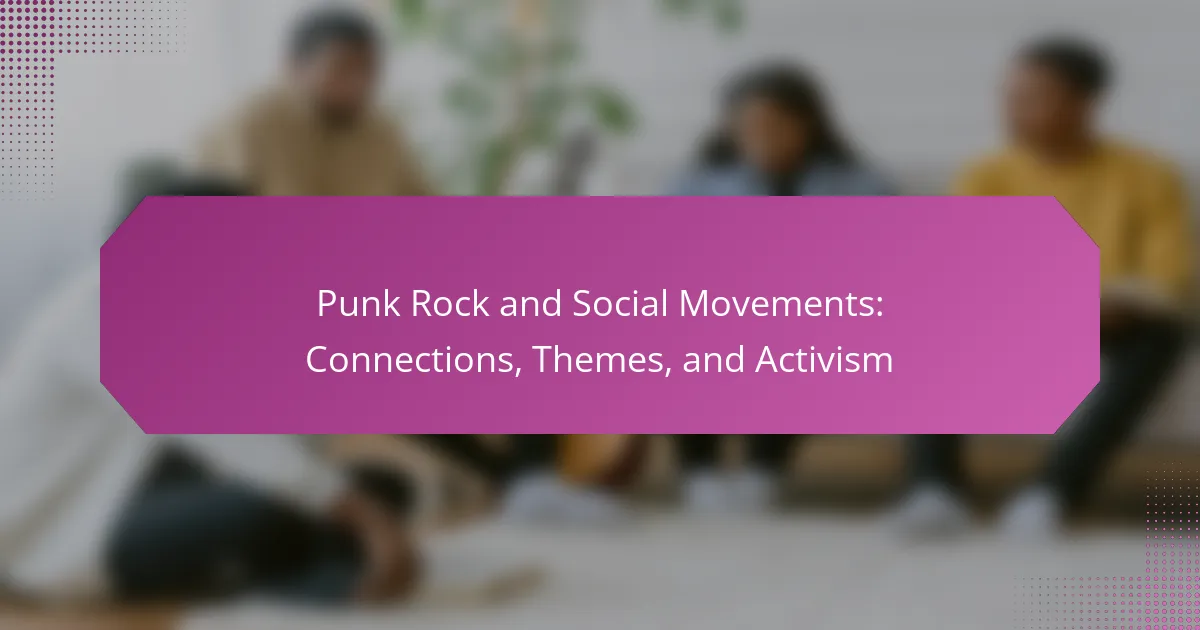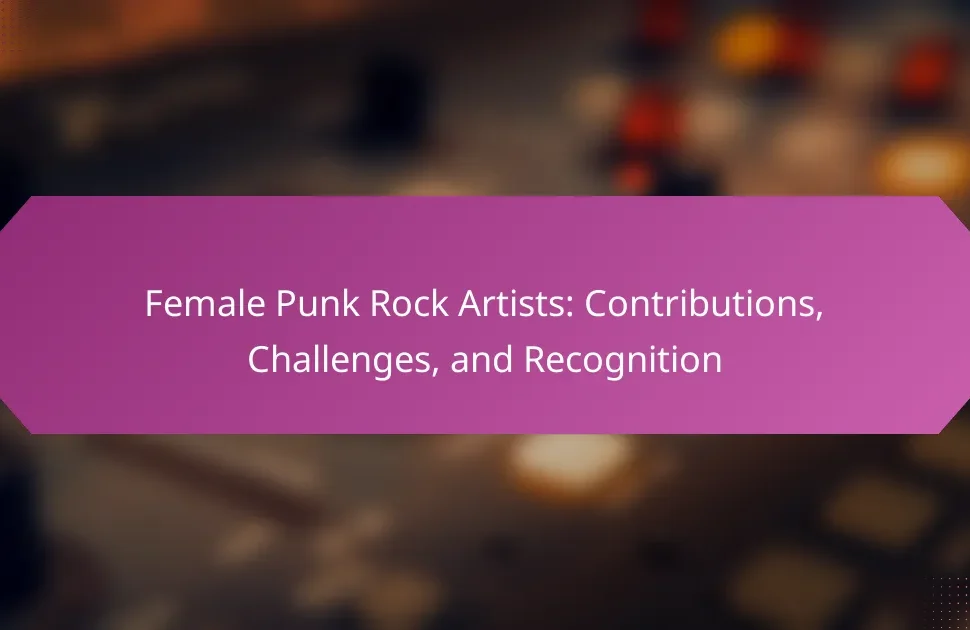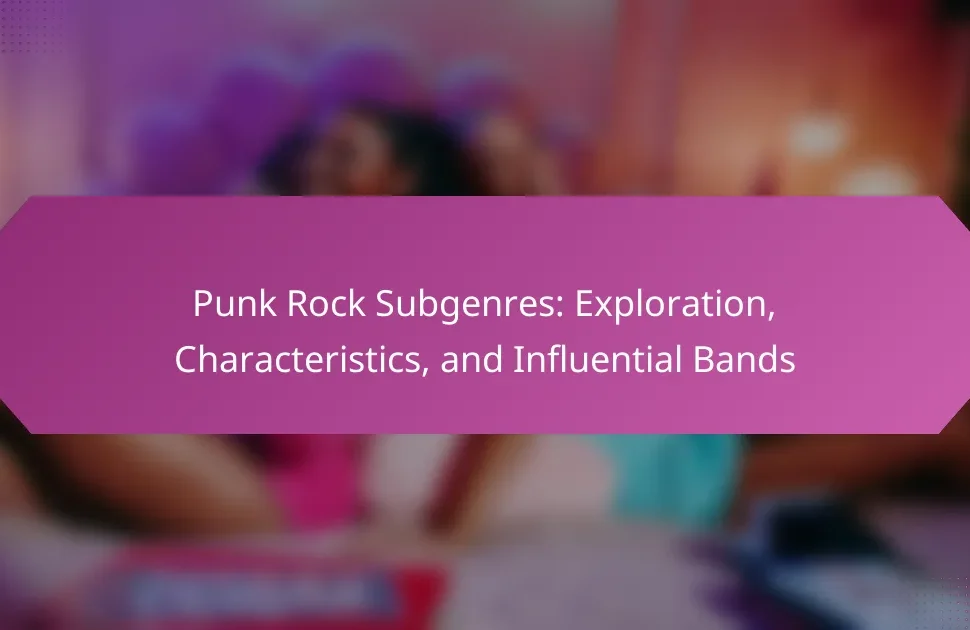Punk rock has played a pivotal role in shaping social movements by challenging societal norms and advocating for change. This article explores the connections between punk rock and activism, highlighting key themes of rebellion and community solidarity. It examines how punk’s DIY ethos promotes grassroots organizing and addresses issues like inequality and war. Additionally, it delves into punk’s intersection with various social movements, showcasing its impact on global activism.
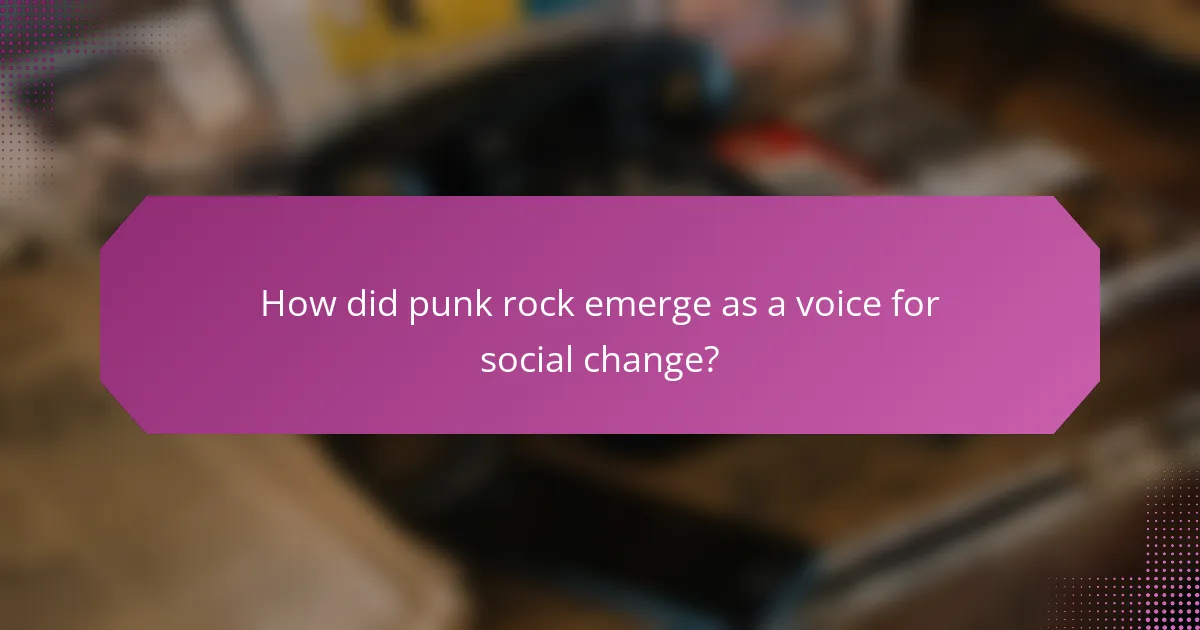
How did punk rock emerge as a voice for social change?
Punk rock emerged as a voice for social change by challenging societal norms and expressing dissent. It became a platform for activism, addressing issues like inequality, war, and political corruption. Bands like The Clash and Sex Pistols articulated frustrations of marginalized communities, inspiring collective action. The genre’s DIY ethos encouraged grassroots movements, fostering a sense of empowerment among youth. Punk rock’s raw energy and unapologetic lyrics resonated with those seeking to provoke change, making it a significant cultural force in the 1970s and beyond.
What are the key historical events that shaped punk rock’s connection to activism?
Punk rock’s connection to activism emerged through key historical events that emphasized social justice and anti-establishment sentiments. The 1970s saw punk bands like The Clash and Dead Kennedys address political issues, advocating for change. The formation of groups like Rock Against Racism in the UK united musicians and activists against racism, illustrating punk’s role in social movements. Additionally, the anti-globalization protests in the late 1990s highlighted punk’s ongoing influence, as bands supported grassroots activism and challenged corporate power. These events collectively shaped punk rock’s identity as a vehicle for activism and social commentary.
Which notable punk rock bands have championed social movements?
Notable punk rock bands that have championed social movements include The Clash, Dead Kennedys, and Anti-Flag. These bands used their music to address issues like anti-war sentiments, civil rights, and environmental activism. The Clash’s “London Calling” highlighted social unrest, while Dead Kennedys tackled political corruption. Anti-Flag’s lyrics often promote activism against war and inequality. Their influence extends beyond music, inspiring fans to engage in various social causes.
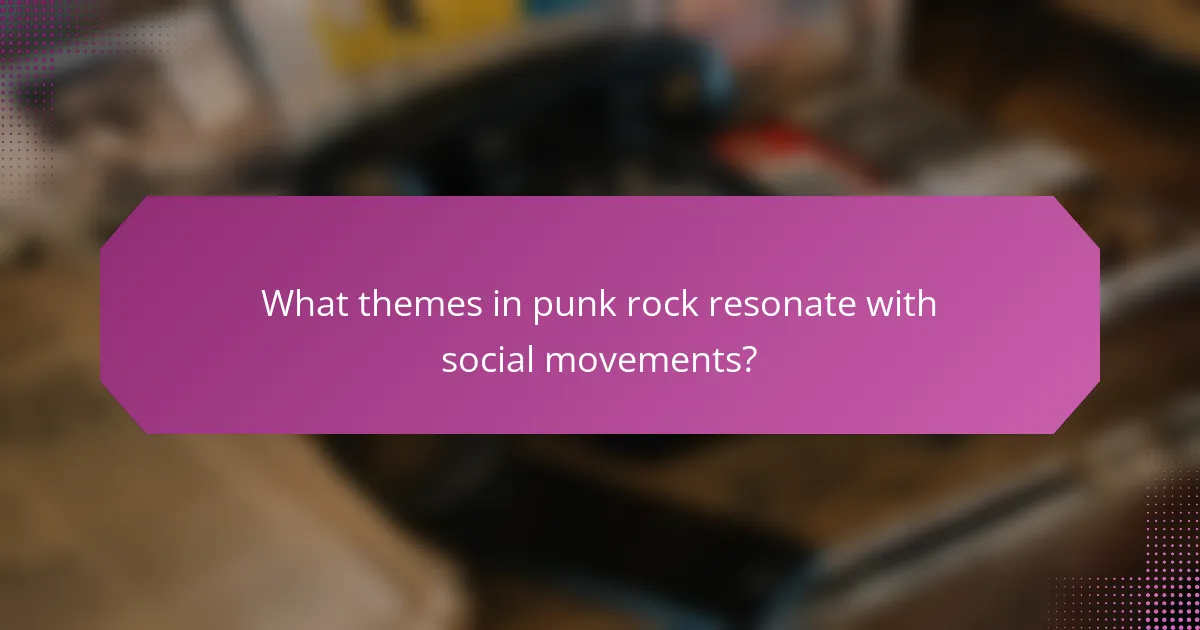
What themes in punk rock resonate with social movements?
Punk rock themes strongly resonate with social movements through their emphasis on rebellion, anti-establishment sentiments, and community solidarity. These themes often challenge societal norms and advocate for marginalized voices. The genre’s origins in the 1970s were closely tied to political unrest, reflecting issues like inequality and war.
Punk rock promotes activism by encouraging direct action and grassroots organizing. Bands like The Clash and Dead Kennedys used their music to address social issues, inspiring fans to engage in political discourse. The DIY ethic of punk fosters a sense of empowerment, enabling individuals to create change within their communities.
Additionally, punk rock intersects with various social movements, including feminism and environmentalism. The genre’s inclusive nature allows for diverse perspectives, strengthening its connection to wider activist efforts. As a result, punk rock serves as both a cultural expression and a catalyst for social change.
How does anti-establishment sentiment manifest in punk lyrics?
Anti-establishment sentiment in punk lyrics often manifests through critiques of authority and societal norms. Punk rock challenges political systems, commercialism, and mainstream culture. Lyrics frequently express frustration with government corruption and social injustice, promoting individualism and rebellion. Artists use raw language and imagery to convey urgency and discontent, reflecting the movement’s roots in countercultural activism. This unique attribute of punk lyrics resonates with listeners seeking authenticity and a voice against oppression.
What role does community play in punk rock culture?
Community plays a vital role in punk rock culture by fostering solidarity and activism. It serves as a platform for collective expression, enabling individuals to voice dissent against societal norms. Punk rock communities often engage in social movements, promoting issues like anti-establishment sentiments and social justice. The shared values within these communities create a sense of belonging, empowering members to challenge the status quo. This grassroots connection drives the punk ethos, emphasizing unity and resistance through music and art.
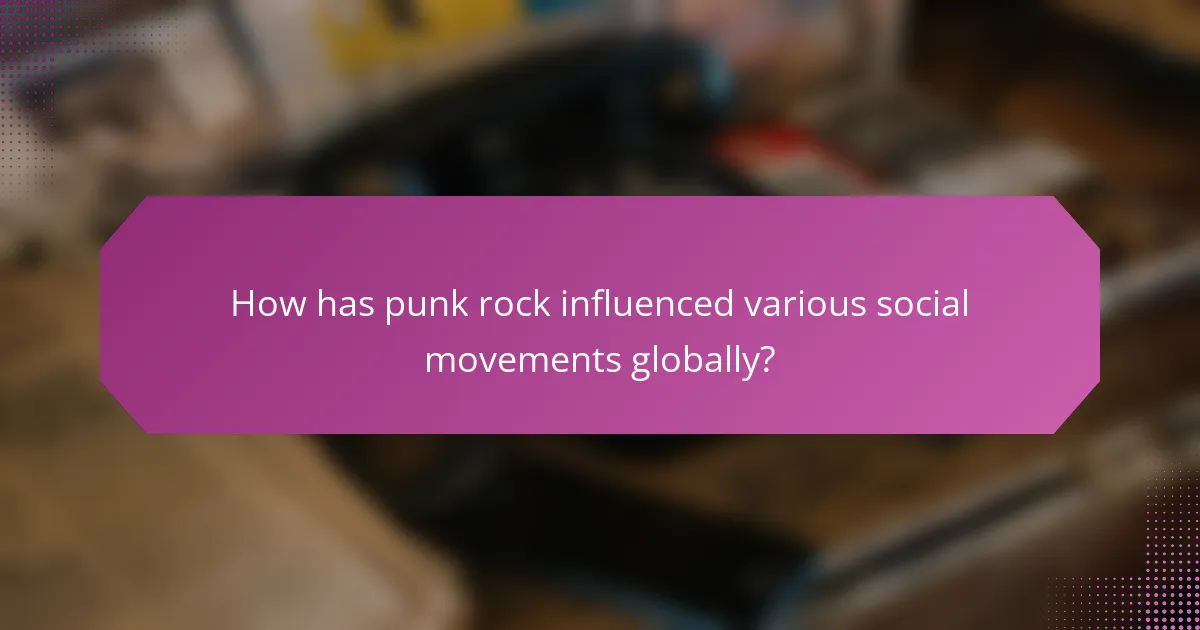
How has punk rock influenced various social movements globally?
Punk rock has significantly influenced various social movements globally by promoting anti-establishment sentiments and social justice. Its raw energy and rebellious spirit resonate with marginalized groups, inspiring activism.
In the 1970s, punk rock emerged as a voice for youth disillusionment, addressing issues like unemployment and inequality. Bands like The Clash and Sex Pistols challenged political norms, galvanizing protests against war and oppression.
Punk rock’s DIY ethos encourages grassroots organizing, fostering community engagement. Many punk musicians actively support causes such as environmentalism, LGBTQ rights, and anti-racism, using their platforms to raise awareness and inspire action.
Globally, punk rock has intersected with movements like anti-globalization and feminism. In countries like Brazil and Russia, punk bands have become symbols of resistance, advocating for human rights and freedom of expression.
What impact has punk rock had on environmental activism?
Punk rock has significantly influenced environmental activism by promoting awareness and encouraging grassroots movements. Bands like Green Day and The Clash have addressed ecological issues in their lyrics, inspiring fans to engage in activism. The DIY ethos of punk culture fosters community-driven initiatives, emphasizing local solutions to global problems. Events like benefit concerts further amplify environmental messages, making punk rock a powerful ally in the fight for sustainability.
How has punk rock intersected with racial and gender equality movements?
Punk rock has actively supported racial and gender equality movements since its inception. The genre’s DIY ethos fosters inclusivity and challenges societal norms. Bands like Bad Brains and The Clash addressed racial issues, while groups like Bikini Kill championed feminist ideals. Punk rock’s intersection with these movements highlights its role in advocating for social justice and amplifying marginalized voices.
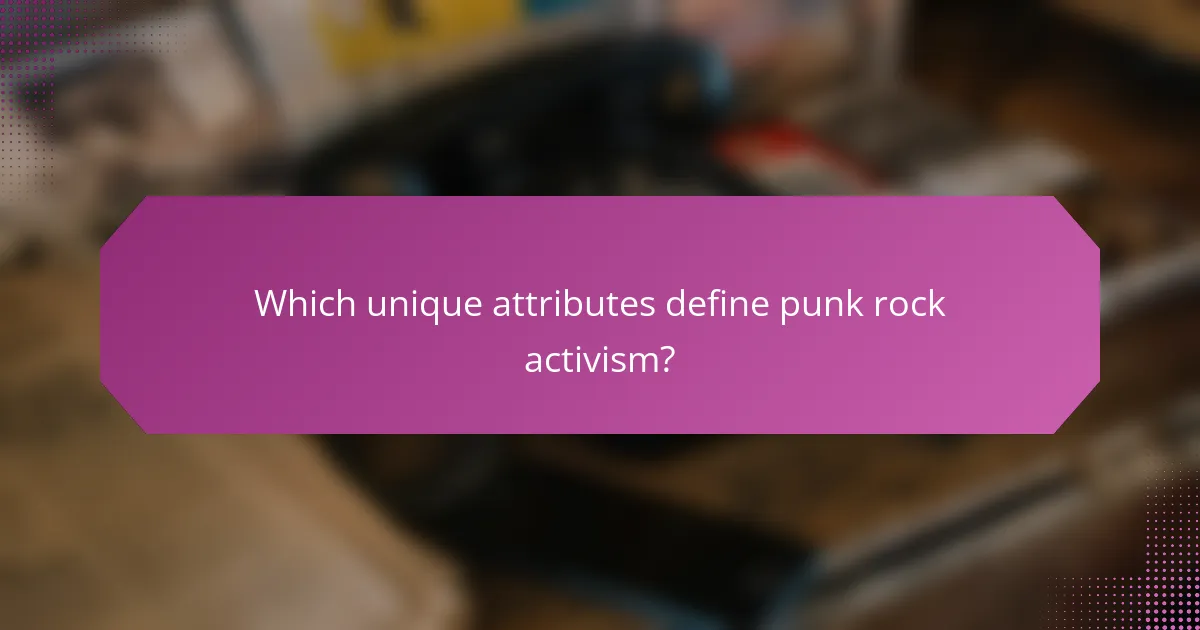
Which unique attributes define punk rock activism?
Punk rock activism is defined by its unique attributes of anti-establishment sentiment, grassroots organization, and a focus on social justice. These attributes foster a culture of rebellion against societal norms and encourage active participation in political discourse. Punk rock musicians often use their platform to raise awareness about issues like inequality, war, and environmental concerns. The genre’s DIY ethos empowers individuals to create change, reflecting a commitment to authenticity and direct action.
How do DIY ethics empower punk rock activists?
DIY ethics empower punk rock activists by promoting self-sufficiency and grassroots organizing. This approach encourages individuals to take control of their creative expression and social initiatives. Through DIY practices, punk activists foster community engagement and challenge mainstream norms. They emphasize authenticity and direct action, which enhances their impact on social movements. This empowerment is rooted in the unique attribute of punk culture, which values individualism and collective resistance.
What are the distinctive strategies used by punk rockers in their activism?
Punk rockers employ distinctive strategies in their activism, focusing on grassroots organizing, direct action, and cultural expression. They often leverage music as a platform to raise awareness about social issues, creating a sense of community and solidarity.
Many punk rockers engage in DIY ethics, promoting self-sufficiency and rejecting corporate influence. This approach fosters independent venues and labels, allowing for more authentic and unfiltered messages.
Additionally, punk activism frequently emphasizes inclusivity and intersectionality, addressing a wide range of social justice issues. This multifaceted strategy enhances their impact and resonates with diverse audiences.
Through these strategies, punk rockers challenge societal norms and inspire change, demonstrating the power of music as a tool for activism.
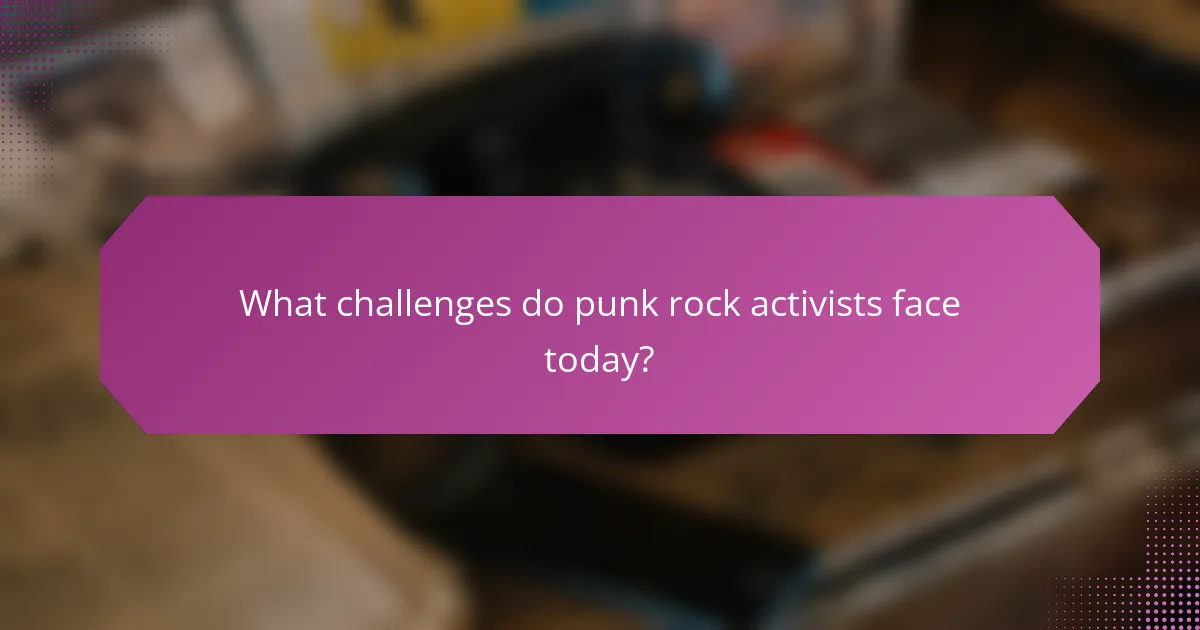
What challenges do punk rock activists face today?
Punk rock activists today face challenges such as mainstream commercialization, political apathy, and internal division. These obstacles hinder their ability to mobilize effectively and maintain authenticity. Mainstream platforms often dilute punk messages, while political disinterest among youth reduces engagement. Additionally, differing ideologies within the punk community can lead to fragmentation, complicating collective action.
How does commercialization affect the authenticity of punk rock activism?
Commercialization often undermines the authenticity of punk rock activism. As punk rock gains mainstream popularity, its original anti-establishment message can dilute, leading to commodification. This shift may prioritize profit over genuine activism, altering the movement’s core values. Many punk bands shift focus from social issues to commercial success, impacting their connection to grassroots movements. The unique attribute of grassroots authenticity becomes rare as commercialization prevails, challenging the movement’s integrity and its influence on social change.
What are the common pushbacks from mainstream society against punk rock movements?
Mainstream society often pushes back against punk rock movements due to perceived anti-establishment attitudes, noise levels, and fashion choices. Critics argue that punk promotes chaos, challenges social norms, and fosters divisiveness. Concerns also arise about the influence of punk on youth culture, with some viewing it as a threat to traditional values. Additionally, mainstream media may portray punk as a fringe movement, overshadowing its deeper messages of activism and social change.
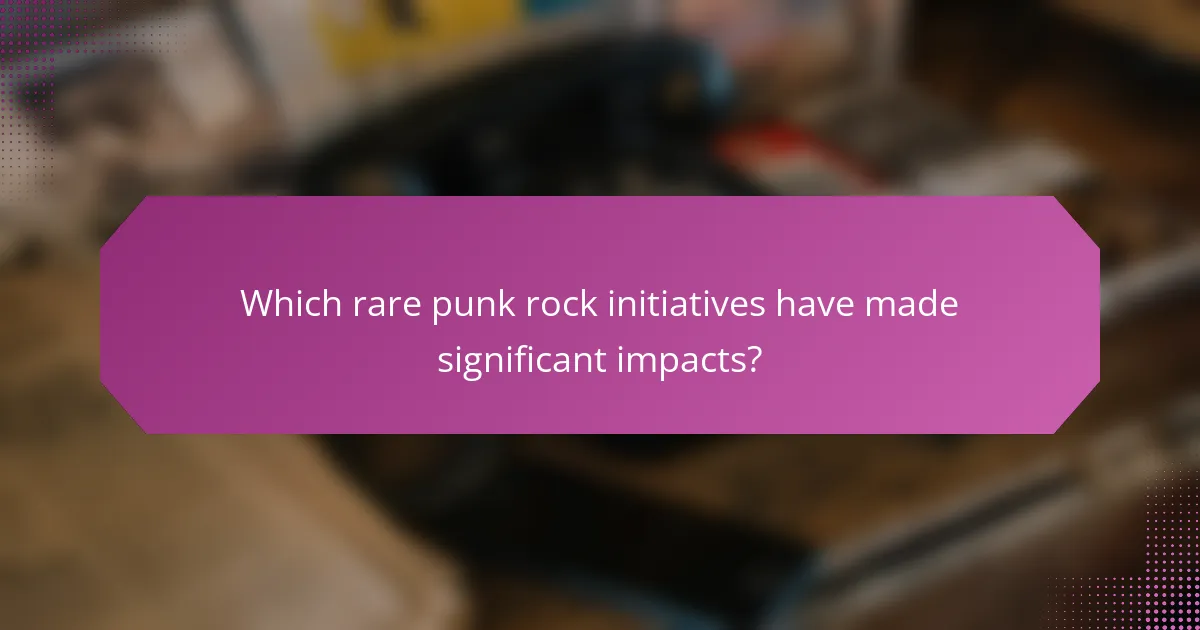
Which rare punk rock initiatives have made significant impacts?
Rare punk rock initiatives have spurred significant social change through activism and community engagement. Notable examples include the Punk Voter campaign, which mobilized youth during elections, and the Rock Against Racism movement, which fought against racial discrimination in the UK. These initiatives showcased punk’s commitment to social justice, using music as a platform for political expression. Additionally, the DIY ethic prevalent in punk culture has fostered grassroots movements, empowering marginalized voices.
What are some lesser-known punk rock festivals that promote activism?
Several lesser-known punk rock festivals promote activism, including Fest in Gainesville, Florida, which supports local charities. Another example is Punk Rock Bowling in Las Vegas, focusing on social justice initiatives. The Punk Rock and Paintbrushes festival raises funds for various causes through art. Additionally, the Rebellion Festival in Blackpool, UK, features discussions on activism within punk culture. These events highlight punk’s connection to social movements and community engagement.
How have underground punk scenes contributed to local social movements?
Underground punk scenes have significantly influenced local social movements by fostering activism and community engagement. These scenes often promote anti-establishment sentiments and encourage grassroots organizing. Punk music provides a platform for marginalized voices, addressing issues like inequality, racism, and environmentalism.
For example, the DIY ethos prevalent in punk culture empowers individuals to create change locally, leading to initiatives such as community gardens and social justice events. Additionally, punk festivals often serve as fundraisers for various causes, enhancing their impact on local activism.
The unique attribute of punk’s raw and unfiltered expression resonates with those seeking social change, making it a powerful catalyst for movements. As a result, many punk bands actively support and participate in local campaigns, further intertwining music with advocacy.
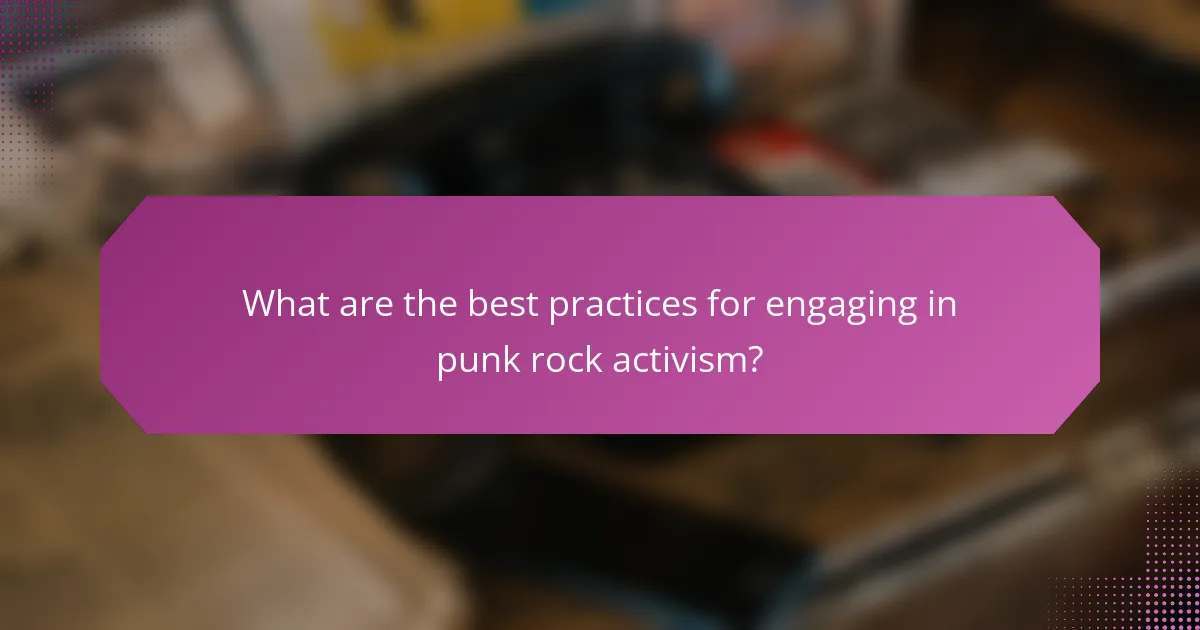
What are the best practices for engaging in punk rock activism?
Engaging in punk rock activism involves embracing authenticity, community involvement, and direct action. Focus on grassroots efforts and local issues to create impactful change.
1. Foster community connections through local events and collaborations.
2. Utilize social media to amplify messages and mobilize supporters.
3. Create inclusive spaces for diverse voices within the punk scene.
4. Use music as a medium to raise awareness about social issues.
5. Encourage critical thinking and discussions around political themes in lyrics.
How can individuals effectively use punk rock as a platform for social change?
Individuals can effectively use punk rock as a platform for social change by embracing its core themes of rebellion and activism. Punk rock promotes critical dialogue on social issues through its music and lyrics. Artists often address topics like inequality, war, and environmental concerns, encouraging listeners to reflect and act.
By organizing concerts, rallies, and community events, punk musicians and fans can mobilize support for various causes. These gatherings create a sense of solidarity, amplifying messages and fostering collective action. Moreover, punk rock culture often emphasizes DIY ethics, empowering individuals to create their own narratives and solutions.
Social media serves as a powerful tool for spreading punk rock’s messages. Musicians and activists can reach broader audiences, share resources, and connect with like-minded individuals. Engaging with fans through online platforms can further inspire action and awareness around pressing social issues.
What common mistakes should activists avoid in the punk rock scene?
Activists in the punk rock scene should avoid these common mistakes: focusing solely on music rather than message, alienating potential allies, neglecting community engagement, and failing to adapt to changing social dynamics. Prioritizing authenticity over popularity is crucial. Misunderstanding punk’s roots can lead to ineffective activism.
